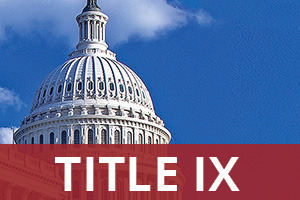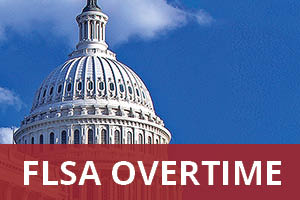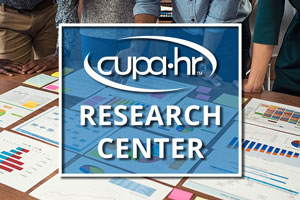
by CUPA-HR

CUPA-HR General Counsel Ira Shepard’s overview this month includes Dartmouth College’s refusal to bargain with the recently unionized men’s basketball team. Dartmouth contends the student-athletes do not meet the NLRA definition of employees, which may result in the NLRB filing unfair labor practice charges. Professors at Tufts University school of medicine argue that having to raise funds for their salaries violates their contractual rights to academic freedom and to economic security. A university baseball coach’s claim of reverse discrimination is dismissed, but he is allowed to proceed with a retaliation claim against St. Edward’s University. In Anne Arundel, Maryland, the school board prevailed over a former track coach who claimed discrimination, having been fired for a verbal and physical altercation with a student. Across the country, five states have passed bans on anti-union captive-audience meetings, which will likely be challenged by litigation in some states, while bans on DEI training that have gone into effect in other states have been met with legal challenges.
 In his recent webinar for CUPA-HR, Rahul Thadani, senior executive director of HR information systems at the University of Alabama at Birmingham, answered some of the most frequently raised questions about AI in HR. He also spoke to the most prevalent worries, including concerns about data privacy and whether AI will compete with humans for jobs. In addition to covering the basics on AI and how it works, Thadani addressed questions about the risks and rewards of using AI in HR, including: How can AI speed up productivity now? What AI tools should HR be using? How well is AI integrated into enterprise software? What are the risks and downsides of using AI? What role will AI play in the future of HR? Thadani also put to rest a common fear about AI: that it will replace human jobs. He believes that HR is too complex, too fundamentally human a role to be automated.
In his recent webinar for CUPA-HR, Rahul Thadani, senior executive director of HR information systems at the University of Alabama at Birmingham, answered some of the most frequently raised questions about AI in HR. He also spoke to the most prevalent worries, including concerns about data privacy and whether AI will compete with humans for jobs. In addition to covering the basics on AI and how it works, Thadani addressed questions about the risks and rewards of using AI in HR, including: How can AI speed up productivity now? What AI tools should HR be using? How well is AI integrated into enterprise software? What are the risks and downsides of using AI? What role will AI play in the future of HR? Thadani also put to rest a common fear about AI: that it will replace human jobs. He believes that HR is too complex, too fundamentally human a role to be automated. 


 On April 10, the White House Office of Information and Regulatory Affairs (OIRA) announced it had concluded review of the Department of Education’s (ED) final rule to amend Title IX. OIRA review is the final step in the regulatory process, and we expect the ED will issue the final rule any day now. The ED released the text of the proposed rule on June 23, 2022, though the Federal Register did not officially publish the proposal until several weeks later on July 12, 2022. The agency received over 240,000 comments in response, including CUPA-HR comments seeking clarification on the overlaps between the ED’s proposal with institutions’ existing obligations to address employment discrimination. CUPA-HR also joined comments led by the American Council on Education.
On April 10, the White House Office of Information and Regulatory Affairs (OIRA) announced it had concluded review of the Department of Education’s (ED) final rule to amend Title IX. OIRA review is the final step in the regulatory process, and we expect the ED will issue the final rule any day now. The ED released the text of the proposed rule on June 23, 2022, though the Federal Register did not officially publish the proposal until several weeks later on July 12, 2022. The agency received over 240,000 comments in response, including CUPA-HR comments seeking clarification on the overlaps between the ED’s proposal with institutions’ existing obligations to address employment discrimination. CUPA-HR also joined comments led by the American Council on Education.  On April 11, 2024, the White House Office of Information and Regulatory Affairs (OIRA) announced it had concluded review of the U.S. Department of Labor’s (DOL) final overtime pay rule. The rule is expected to increase the minimum salary threshold for the executive, administrative and professional (EAP or white collar) employee exemptions to overtime pay requirements under the Fair Labor Standards Act (FLSA) regulations. OIRA review is the final step in the regulatory process, and we expect DOL will release the final rule any day now. We will send another alert as soon as the final rule is released.
On April 11, 2024, the White House Office of Information and Regulatory Affairs (OIRA) announced it had concluded review of the U.S. Department of Labor’s (DOL) final overtime pay rule. The rule is expected to increase the minimum salary threshold for the executive, administrative and professional (EAP or white collar) employee exemptions to overtime pay requirements under the Fair Labor Standards Act (FLSA) regulations. OIRA review is the final step in the regulatory process, and we expect DOL will release the final rule any day now. We will send another alert as soon as the final rule is released.  CUPA-HR General Counsel Ira Shepard’s overview this month includes Dartmouth College’s refusal to bargain with the recently unionized men’s basketball team. Dartmouth contends the student-athletes do not meet the NLRA definition of employees, which may result in the NLRB filing unfair labor practice charges. Professors at Tufts University school of medicine argue that having to raise funds for their salaries violates their contractual rights to academic freedom and to economic security. A university baseball coach’s claim of reverse discrimination is dismissed, but he is allowed to proceed with a retaliation claim against St. Edward’s University. In Anne Arundel, Maryland, the school board prevailed over a former track coach who claimed discrimination, having been fired for a verbal and physical altercation with a student. Across the country, five states have passed bans on anti-union captive-audience meetings, which will likely be challenged by litigation in some states, while bans on DEI training that have gone into effect in other states have been met with legal challenges.
CUPA-HR General Counsel Ira Shepard’s overview this month includes Dartmouth College’s refusal to bargain with the recently unionized men’s basketball team. Dartmouth contends the student-athletes do not meet the NLRA definition of employees, which may result in the NLRB filing unfair labor practice charges. Professors at Tufts University school of medicine argue that having to raise funds for their salaries violates their contractual rights to academic freedom and to economic security. A university baseball coach’s claim of reverse discrimination is dismissed, but he is allowed to proceed with a retaliation claim against St. Edward’s University. In Anne Arundel, Maryland, the school board prevailed over a former track coach who claimed discrimination, having been fired for a verbal and physical altercation with a student. Across the country, five states have passed bans on anti-union captive-audience meetings, which will likely be challenged by litigation in some states, while bans on DEI training that have gone into effect in other states have been met with legal challenges.  On April 4, CUPA-HR’s government relations team, President and CEO Andy Brantley, and four national board members met with officials at the Department of Labor (DOL) and the Office of Information and Regulatory Affairs (OIRA) to discuss the upcoming overtime regulations to increase the minimum salary threshold. During the call, the group expressed broad concerns with the rule, as well as the specific challenges implementation of the new rule could create for different types of institutions in various areas of the country. The OIRA review marks one of the last steps required before DOL can publish the final rule for public viewing.
On April 4, CUPA-HR’s government relations team, President and CEO Andy Brantley, and four national board members met with officials at the Department of Labor (DOL) and the Office of Information and Regulatory Affairs (OIRA) to discuss the upcoming overtime regulations to increase the minimum salary threshold. During the call, the group expressed broad concerns with the rule, as well as the specific challenges implementation of the new rule could create for different types of institutions in various areas of the country. The OIRA review marks one of the last steps required before DOL can publish the final rule for public viewing.  During his recent keynote at CUPA-HR’s Higher Ed HR Accelerator, Commissioner Keith Sonderling of the Equal Opportunity Employment Commission observed, “now, AI exists in HR in every single stage of employment,” from writing job descriptions, to sourcing candidates and scheduling interviews, and well into the career lifecycle of employees. But even if you haven’t yet integrated AI into your daily workflow, free AI tools can still be a powerful assistant. With some common-sense guardrails in place, AI can help you automate repetitive tasks, make software like Excel easier to use, analyze information and polish your writing.
During his recent keynote at CUPA-HR’s Higher Ed HR Accelerator, Commissioner Keith Sonderling of the Equal Opportunity Employment Commission observed, “now, AI exists in HR in every single stage of employment,” from writing job descriptions, to sourcing candidates and scheduling interviews, and well into the career lifecycle of employees. But even if you haven’t yet integrated AI into your daily workflow, free AI tools can still be a powerful assistant. With some common-sense guardrails in place, AI can help you automate repetitive tasks, make software like Excel easier to use, analyze information and polish your writing.  New research from CUPA-HR has found that median pay increases for most higher education employees in 2023-24 continued the upward trend seen last year (and exceeded the inflation rate for the first time since 2019-20). However, the findings also show that most higher ed employees are still being paid less than they were in 2019-20 in inflation-adjusted dollars. The largest gap between pre-pandemic inflation-adjusted salaries and current salaries is for tenure-track faculty (earning 9.7% less), followed by non-tenure-track teaching faculty (earning 8.2% less). The smallest gap is for staff (earning only 0.3% less).
New research from CUPA-HR has found that median pay increases for most higher education employees in 2023-24 continued the upward trend seen last year (and exceeded the inflation rate for the first time since 2019-20). However, the findings also show that most higher ed employees are still being paid less than they were in 2019-20 in inflation-adjusted dollars. The largest gap between pre-pandemic inflation-adjusted salaries and current salaries is for tenure-track faculty (earning 9.7% less), followed by non-tenure-track teaching faculty (earning 8.2% less). The smallest gap is for staff (earning only 0.3% less).  In 2020, the human resources team at the University of Texas at Dallas was set to launch its leadership and professional development program, the culmination of 18 months of dedicated work. As the pandemic took hold, the question confronting Colleen Dutton, chief human resources officer, and her team was, “Now what do we do?” In their recent webinar for CUPA-HR, Dutton and Jillian McNally, a talent development specialist, explained how their COVID-19 pivot was a blessing in disguise, helping them completely reconstruct leadership training from the ground up. The resulting, reimagined program — BRIGHT Leaders — received a 2023 CUPA-HR Innovation Award for groundbreaking thinking in higher ed HR. BRIGHT Leaders speaks to the needs of today’s employees, who desire professional development programs that are flexible and encourages everyone on campus to lead from where they are.
In 2020, the human resources team at the University of Texas at Dallas was set to launch its leadership and professional development program, the culmination of 18 months of dedicated work. As the pandemic took hold, the question confronting Colleen Dutton, chief human resources officer, and her team was, “Now what do we do?” In their recent webinar for CUPA-HR, Dutton and Jillian McNally, a talent development specialist, explained how their COVID-19 pivot was a blessing in disguise, helping them completely reconstruct leadership training from the ground up. The resulting, reimagined program — BRIGHT Leaders — received a 2023 CUPA-HR Innovation Award for groundbreaking thinking in higher ed HR. BRIGHT Leaders speaks to the needs of today’s employees, who desire professional development programs that are flexible and encourages everyone on campus to lead from where they are.